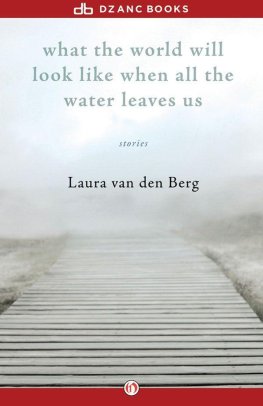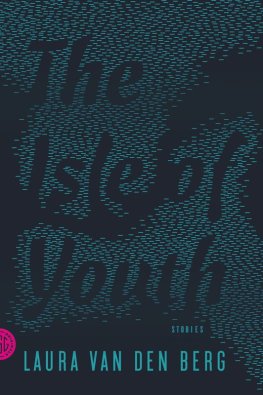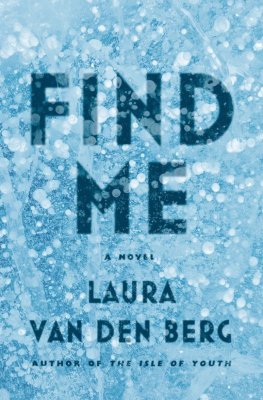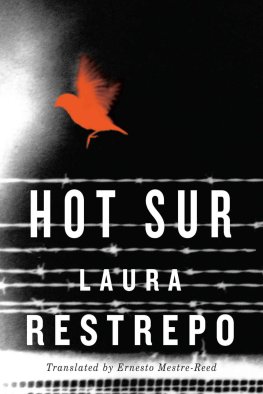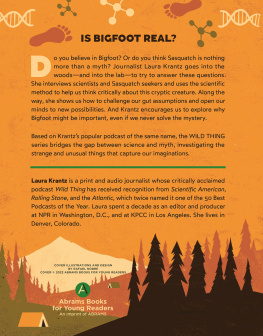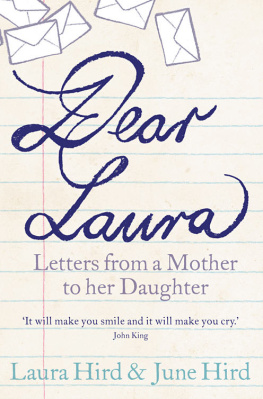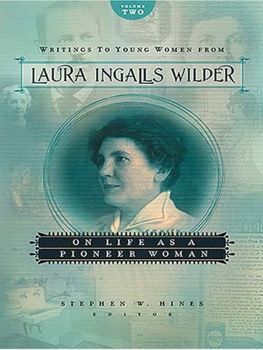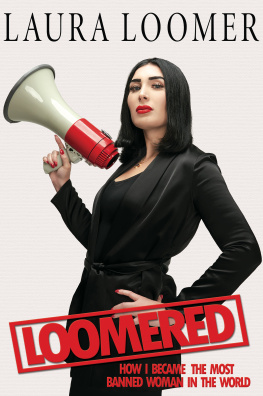Laura van den Berg
What the World Will Look Like When All the Water Leaves Us
To my mother, Caroline Merritt,
and to my father, Egerton van den Berg.

Some people dream of being chased by Bigfoot. I found it hard to believe at first, but its true. I was driving back from Los Angeles in August, after a summer of waiting tables and failed casting calls, when I saw a huge wooden arrow that pointed down a dirt road, actors wanted painted across it in white letters. I was in Northern California and still a long way from Washington, but I followed the sign down the road and parked in front of a silver airstream trailer. It was dark inside and I felt the breeze of a fan. The fat man behind the desk said hed never hired a woman before. And then he went on to describe exactly what happens at the Bigfoot Recreation Park. People come here to have an encounter with Bigfoot. Most of their customers have been wanting this moment for years. I would have to lumber and roar with convincing masculinity. I can do that, I said, no problem. And I proved it in my audition. After putting on the costume and staggering around the trailer for a few minutes, bellowing and shaking my arms, I stopped and removed the Bigfoot mask. The fat man was smiling. He said I would always be paid in cash.
Today Im going after a woman from Albuquerque. Shes small and sharp-shouldered, dressed in khaki shorts and a pink sweatshirt. Id be willing to bet no one knows shes here. For a brief time, this woman will be living in another world, where all that matters is escaping Bigfoot. People say the park is great for realigning their priorities, for reminding them that survival is an active choice. Im watching her from behind a dense cluster of bushes. The fat man has informed me that she wants to be ambushed. This isnt surprising. Most people crave the shock.
My breath is warm inside the costume. The rubber has a faintly sweet smell. I like to stroke my arms and listen to the swishing sound of the fake fur. The mask has eyeholes, but blocks my peripheral vision, so I can only see straight ahead. The fat man says this is an unexpected benefit of not having more advanced masks. According to him, Bigfoot is a primitive creature, not wily like extraterrestrials or the Loch Ness Monster, and only responds to whats directly in front of him. Two other people work at the park, Jeffrey and Mack, but our shifts never overlap. The fat man thinks its important for us to not see our counterparts in person, to believe we are the only Bigfoot.
I wait for the woman to relax, watching for the instant when she begins to think: maybe there wont be a monster after all. I can always tell when this thought arrives. First their posture softens. Then their expression changes from confused to relieved to disappointed. More than anything the ambush is about waiting the customer out. I struggle to stay in character during these quiet moments; its tempting to consider my own life and worries, but when the time comes to attack, it will only be believable if Ive been living with Bigfoots loneliness and desires for at least an hour.
The woman yawns and rubs her cheek. She bends over and scratches her knee. She stops looking around the forest. Her expectations are changing. She checks her watch. I start counting backwards from ten. When I reach zero, I pound into the clearing and release the first roar: a piercing animal sound still foreign to my ears.

Jimmy and I are sprawled out in his backyard, staring through the branches of a pear tree. Earlier I found him sitting on the front porch, trying to stop a nosebleed. I told him to tilt his head back, then pressed the tissue against his nostrils and watched the white bloom into crimson. Its not love. Or at least not what I thought love would feel like. It hurts to be near him and it hurts to be away.
What do you dream about? I ask.
Of a time when the world was nothing but water.
I spread my legs and arms and imagine floating in an enormous pool. Jimmy lives across the street from the bungalow Ive been renting since August, a long structure with low ceilings and chipped turquoise paint. When I first moved into the neighborhood, he dropped by and offered to give me a hand. I didnt really have anything to unpack, but invited him inside anyway. He grew up in Oregon and, after high school, drifted over to California, where he took a job as a postman. He was willowy and pale, with dark hair and green eyes and long eyelashes. He didnt look like anyone else I knew. I pulled a bottle of Jim Beam out of my suitcase and he ended up staying the night.
He rolls toward me, leaving a silhouette of flattened grass. What about you?
I dont remember my dreams, I say. I cant get them to stay with me.
A hawk with white-tipped wings crosses the sky; I wonder where the bird is headed. Its mid-October. The weather is cool and breezy. I wish we could keep winter from coming, I tell him.
Yeah, he says. Its a real shame.
Jimmy told me he was sick the morning after we met. We were sitting on the floor of my living room, drinking water to ease the hangover. I raised my glass and pointed at the grit pooled in the bottom. He shrugged and said the water has always looked that way. Then he told me about the cold that lasted for three months and the clicking sound of the X-ray machine and the spot on his lungs. When I asked if he had help, he said hed lost touch with his friends in Oregon and hadnt made any new ones in the postal service. His father was dead, and his mother married a carpet salesman and moved east a few years back. His mother tried to arrange a nurse once his outcome became definite, but he refused, saying he didnt want a stranger in the house. He stopped delivering mail months ago and was collecting disability checks.
He told me all this and then said hed understand if I minded and we could just go back to being neighbors. But I told him I didnt mind at all. My older sister, Sara, used to have seizures, though I didnt mention that to Jimmy. As a child, I saw her collapse on tennis courts and roller-skating rinks, in the school cafeteria and on the carpeted floor of our bedroom, her chest heaving like something terrible was trying to get out. My mother made her wear a red bicycle helmet whenever she left the house. My mother, who raised us on her own, worked night shifts at a hospice center. Sometimes, out of nowhere, I remember the scent of rubbing alcohol and ointment on her hands.
How was work? Jimmy asks.
Not bad. I stretch my legs and bump against a browning pear. At the end of the summer, the branches were heavy with fruit, but halfway through September, the pears began rotting and falling to the ground. I gave a woman from Albuquerque a good scare.
You can practice your roar today if you want, he says. Since were already outside.
I can only do it when Im in costume. I kick the pear and listen to it roll through the grass. Its impossible to get into character if Im not wearing it.
He moves closer and presses his face into my neck. You wouldve made a wonderful actress, he mumbles into my skin.
Whenever Jimmy asks about my months in Los Angeles, I tell him how difficult it was to make enough money, how alien I felt carrying trays through a chic bistro that boasted a fifteen-page wine list and thirty-dollar desserts. How I used to dream of fame, of seeing my face staring back at me in magazines and hearing the echo of my voice in dark theaters and never being lonely. When he wants to know about the acting, I tell him the casting directors said I wasnt talented enough. I dont tell him that they often praised my poise and personality, but in the end all said the same thing: you just arent what were looking for. I dont tell him this felt worse than having them say I wasnt pretty or gifted because it gave me a dangerous amount of hope.

